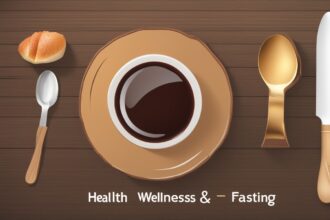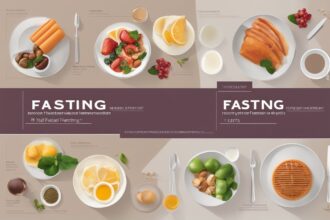Have you ever wondered if skipping a meal or two could actually be good for you? fasting, a practice as old as humanity itself, is gaining modern traction for its remarkable health perks. From weight loss to improved mental clarity, the fasting benefits are backed by science and embraced by wellness enthusiasts worldwide. Whether you’re curious about intermittent fasting or longer fasts, this guide will walk you through the transformative effects of fasting, why it works, and how you can safely incorporate it into your lifestyle. Let’s dive into the world of fasting and explore how it can help you feel your best!
What Are the Core Fasting Benefits?
Fasting, at its essence, is the voluntary abstention from food for a specific period. While it’s often tied to spiritual or cultural practices, the health advantages of fasting are what make it a hot topic today. The primary fasting benefits include improved metabolic health, weight management, and cellular repair. When you fast, your body shifts from using glucose as its main energy source to burning stored fat, a process called ketosis. This metabolic switch not only helps shed extra pounds but also triggers a cascade of positive changes in your body. Studies, such as those published in the New England Journal of Medicine, highlight how fasting can lower insulin resistance, reduce inflammation, and even promote longevity. It’s like hitting a reset button for your system!
Fasting for Weight Loss: A Natural Approach
One of the most celebrated fasting benefits for weight loss is its simplicity. Unlike restrictive diets that leave you counting calories, fasting focuses on when you eat rather than what you eat. Intermittent fasting (IF), for example, cycles between eating windows and fasting periods—like the popular 16:8 method, where you fast for 16 hours and eat during an 8-hour window. This approach naturally reduces calorie intake while boosting fat-burning hormones like norepinephrine. Research from the Journal of Translational Medicine shows that IF can lead to a 3-8% weight loss over 3-24 weeks. Plus, fasting helps preserve muscle mass better than traditional diets, making it a sustainable choice for shedding pounds.
- Try the 16:8 method by skipping breakfast or eating dinner early to create a longer fasting window.
- Stay hydrated with water, herbal tea, or black coffee to curb hunger during fasts.
- Focus on nutrient-dense meals during eating windows to avoid overeating processed foods.
- Start with shorter fasts (12-14 hours) if you’re new to fasting for weight loss.
Boosting Brain Health and Mental Clarity
Ever notice how a light stomach can make you feel more focused? There’s a reason for that! One of the lesser-known fasting benefits for mental health is its impact on brain function. Fasting increases the production of brain-derived neurotrophic factor (BDNF), a protein that supports neuron growth and protects against neurodegenerative diseases like Alzheimer’s. Additionally, fasting promotes autophagy, a cellular cleanup process that removes damaged cells, including in the brain. A 2018 study in Nature Reviews Neuroscience suggests that fasting can enhance cognitive performance, improve mood, and even reduce symptoms of anxiety. Many fasters report feeling sharper and more alert, making it a powerful tool for mental wellness.
Fasting Benefits for Heart Health and Longevity
Your heart might just thank you for fasting. Among the standout fasting benefits for heart health are improved blood pressure, reduced cholesterol levels, and lower triglycerides. Fasting helps decrease insulin levels, which in turn reduces inflammation—a key driver of heart disease. A study by the American College of Cardiology found that intermittent fasting can lower the risk of cardiovascular issues by improving metabolic markers. Beyond that, fasting activates pathways like sirtuins, which are linked to longevity and anti-aging. While we’re not promising immortality, the science suggests that fasting could add healthier years to your life by protecting your heart and slowing cellular aging.
Practical Tips to Maximize Fasting Benefits
Ready to reap the health benefits of fasting? Starting can feel daunting, but with the right approach, it’s easier than you think. The key is to ease into it and listen to your body. Fasting isn’t a one-size-fits-all practice, so experiment with different methods like time-restricted eating, the 5:2 diet (eating normally for 5 days and restricting calories for 2), or even a 24-hour fast once a week. Remember, fasting isn’t about starvation—it’s about giving your body a break. Here are some actionable tips to help you succeed while ensuring you’re nourishing yourself properly.
- Begin with a 12-hour overnight fast to get accustomed to longer periods without food.
- Avoid intense workouts during fasting windows; opt for light activity like walking.
- Break your fast with a balanced meal of protein, healthy fats, and fiber to stabilize blood sugar.
- Consult a healthcare provider if you have medical conditions like diabetes before starting.
- Track how you feel—journaling can help you notice energy boosts or hunger patterns.
Potential Risks and How to Fast Safely
While the fasting benefits are impressive, it’s not without potential pitfalls. Fasting isn’t suitable for everyone, especially pregnant women, children, or those with eating disorders. Overdoing it can lead to fatigue, irritability, or nutrient deficiencies if meals aren’t balanced. Extended fasts without medical supervision can also pose risks like electrolyte imbalances. The key to unlocking the fasting benefits for health lies in moderation and preparation. Always prioritize hydration, avoid binge-eating after fasts, and stop if you feel unwell. Consulting a doctor or dietitian can provide personalized guidance to ensure fasting complements your health goals without harm.
In wrapping up, the fasting benefits are hard to ignore—from shedding stubborn weight to sharpening your mind and protecting your heart. This ancient practice, now validated by modern science, offers a natural way to enhance your well-being without complicated rules or expensive supplements. Whether you’re drawn to intermittent fasting for its flexibility or curious about longer fasts for deeper detox, the key is to start small, stay consistent, and prioritize your body’s needs. So, why not give fasting a try? Experiment with a short fast this week and see how it feels. You might just unlock a healthier, more vibrant version of yourself. Share your thoughts or experiences with fasting in the comments—we’d love to hear how it’s working for you!






